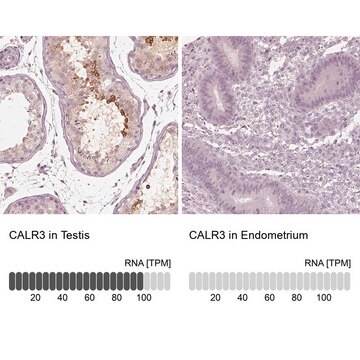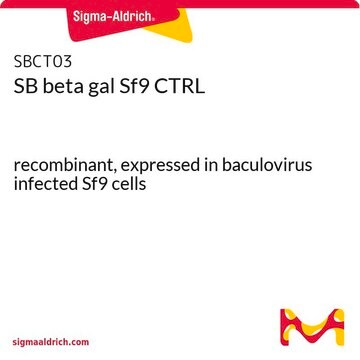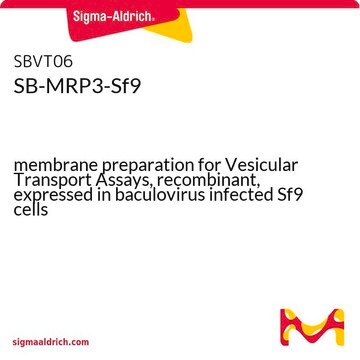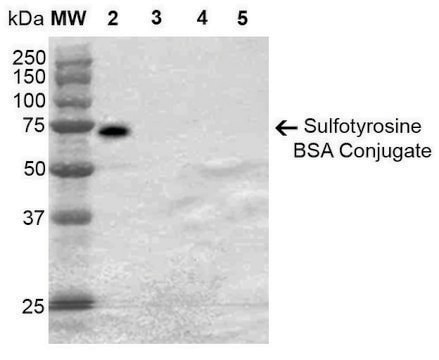SBVT04
SB-MRP1-Sf9
membrane preparation for Vesicular Transport Assays, recombinant, expressed in baculovirus infected Sf9 cells
Synonym(s):
ABCC1, MRP1, MRP1 humanv membrnae vesicles, Multidrug resistance-associated protein 1
Sign Into View Organizational & Contract Pricing
All Photos(1)
About This Item
UNSPSC Code:
12352202
NACRES:
NA.84
Recommended Products
recombinant
expressed in baculovirus infected Sf9 cells
form
liquid
concentration
5 mg/mL
color
off-white
UniProt accession no.
shipped in
dry ice
storage temp.
−70°C
Gene Information
human ... ABCC1(4363)
General description
Membrane Preparations for Vesicular Transport Assays (VT) are suitable for general drug-efflux transporter interaction studies. Both substrate and inhibitor interactions can be assessed using vesicles. The success of substrate interaction studies strongly depends on the passive permeability of the compound. High permeability substrates might not be detected. Control Membranes with no-, or significantly lower transporter activity are also available.
Application
In the vesicular transport assay so-called "inside-out" membrane vesicles containing ABC transporters are applied. Incubating substrates of the respective efflux transporter in the presence of the inverted membrane vesicles and ATP will allow measuring accumulation of the substrates into the vesicles. In many cases radiolabeled reporter substrates are used but recently SOLVO developed the new PREDIVEZTM Vesicular Transport Kits that use fluorescent reporter substrates.
The standard vesicular transport assay is an inhibitory assay performed with cold test articles. This assay provides information on any interaction between the ABC transporter and the test article. The transport of the reporter substrate is measured in the presence of the test article (typically in 7 concentrations) and IC50 is defined as the concentration inhibiting the transport of the reporter substrate by 50%.
Should radiolabeled form of the investigated compound or adequate analytical methods (LC/MS, HPLC) be available, the vesicular transport assay may be performed in a direct format without the reporter substrate and may identify substrate nature of the test article. The vesicular transport substrate assay is a low throughput assay. It is suitable for low permeability test compounds as high permeability compounds may escape from the vesicles through the lipid bilayer.
PREDIVEZ vesicular transport kit is sold separately. This transporter membrane vesicle assay requires the PREDIVEZ vesicular transport kit and corresponding control membrane below:
SB PREDIVEZ Reagent Kit for MRP1 part number SBPVR2-9RXN and corresponding control membrane SB-beta-gal-Sf9-CTRL part number SBCT03-1EA
The standard vesicular transport assay is an inhibitory assay performed with cold test articles. This assay provides information on any interaction between the ABC transporter and the test article. The transport of the reporter substrate is measured in the presence of the test article (typically in 7 concentrations) and IC50 is defined as the concentration inhibiting the transport of the reporter substrate by 50%.
Should radiolabeled form of the investigated compound or adequate analytical methods (LC/MS, HPLC) be available, the vesicular transport assay may be performed in a direct format without the reporter substrate and may identify substrate nature of the test article. The vesicular transport substrate assay is a low throughput assay. It is suitable for low permeability test compounds as high permeability compounds may escape from the vesicles through the lipid bilayer.
PREDIVEZ vesicular transport kit is sold separately. This transporter membrane vesicle assay requires the PREDIVEZ vesicular transport kit and corresponding control membrane below:
SB PREDIVEZ Reagent Kit for MRP1 part number SBPVR2-9RXN and corresponding control membrane SB-beta-gal-Sf9-CTRL part number SBCT03-1EA
Physical form
Supplied as frozen membrane vesicles, containing 5 mg/ml membrane protein, labeled with volume, catalog number (transporter) and date of production.
Legal Information
Distributed for SOLVO Biotechnology, Inc.
Storage Class Code
12 - Non Combustible Liquids
WGK
WGK 1
Flash Point(F)
Not applicable
Flash Point(C)
Not applicable
Certificates of Analysis (COA)
Search for Certificates of Analysis (COA) by entering the products Lot/Batch Number. Lot and Batch Numbers can be found on a product’s label following the words ‘Lot’ or ‘Batch’.
Already Own This Product?
Find documentation for the products that you have recently purchased in the Document Library.
S-M He et al.
Current medicinal chemistry, 18(3), 439-481 (2010-12-15)
Multidrug ABC transporters such as P-glycoprotein (P-gp/MDR1/ABCB1) and multidrug resistance protein 1 (MRP1/ABCC1) play an important role in the extrusion of drugs from the cell and their overexpression can be a cause of failure of anticancer and antimicrobial chemotherapy. Recently
Roger G Deeley et al.
Physiological reviews, 86(3), 849-899 (2006-07-04)
Multidrug Resistance Proteins (MRPs), together with the cystic fibrosis conductance regulator (CFTR/ABCC7) and the sulfonylurea receptors (SUR1/ABCC8 and SUR2/ABCC9) comprise the 13 members of the human "C" branch of the ATP binding cassette (ABC) superfamily. All C branch proteins share
J Wijnholds et al.
Nature medicine, 3(11), 1275-1279 (1997-11-14)
The multidrug resistance-associated protein (MRP) mediates the cellular excretion of many drugs, glutathione S-conjugates (GS-X) of lipophilic xenobiotics and endogenous cysteinyl leukotrienes. Increased MRP levels in tumor cells can cause multidrug resistance (MDR) by decreasing the intracellular drug concentration. The
Cornelius F H Mueller et al.
Circulation research, 97(7), 637-644 (2005-08-27)
Glutathione (GSH) is the major source of intracellular sulfhydryl groups. Oxidized GSH (GSSG) can be recycled to GSH by the GSH reductase or exported from the cell. The mechanism by which GSSG is exported and the consequence of its export
D F Robbiani et al.
Cell, 103(5), 757-768 (2000-12-15)
Adaptive immune responses begin after antigen-bearing dendritic cells (DCs) traffic from peripheral tissues to lymph nodes. Here, we show that DC migration from skin to lymph nodes utilizes the leukotriene C(4) (LTC(4)) transporter multidrug resistance-associated protein 1 (MRP1). DC mobilization
Our team of scientists has experience in all areas of research including Life Science, Material Science, Chemical Synthesis, Chromatography, Analytical and many others.
Contact Technical Service








